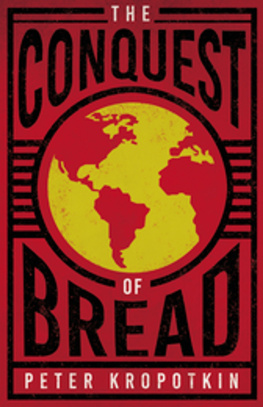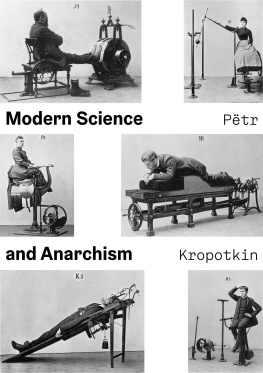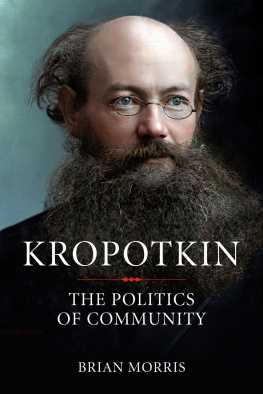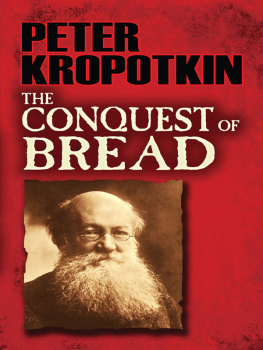kniaz Petr Alekseevich Kropotkin - The Conquest of Bread
Here you can read online kniaz Petr Alekseevich Kropotkin - The Conquest of Bread full text of the book (entire story) in english for free. Download pdf and epub, get meaning, cover and reviews about this ebook. year: 2007, genre: Science. Description of the work, (preface) as well as reviews are available. Best literature library LitArk.com created for fans of good reading and offers a wide selection of genres:
Romance novel
Science fiction
Adventure
Detective
Science
History
Home and family
Prose
Art
Politics
Computer
Non-fiction
Religion
Business
Children
Humor
Choose a favorite category and find really read worthwhile books. Enjoy immersion in the world of imagination, feel the emotions of the characters or learn something new for yourself, make an fascinating discovery.

- Book:The Conquest of Bread
- Author:
- Genre:
- Year:2007
- Rating:4 / 5
- Favourites:Add to favourites
- Your mark:
- 80
- 1
- 2
- 3
- 4
- 5
The Conquest of Bread: summary, description and annotation
We offer to read an annotation, description, summary or preface (depends on what the author of the book "The Conquest of Bread" wrote himself). If you haven't found the necessary information about the book — write in the comments, we will try to find it.
The Conquest of Bread — read online for free the complete book (whole text) full work
Below is the text of the book, divided by pages. System saving the place of the last page read, allows you to conveniently read the book "The Conquest of Bread" online for free, without having to search again every time where you left off. Put a bookmark, and you can go to the page where you finished reading at any time.
Font size:
Interval:
Bookmark:
The Project Gutenberg EBook of The Conquest of Bread, by Peter Kropotkin
This eBook is for the use of anyone anywhere at no cost and with
almost no restrictions whatsoever. You may copy it, give it away or
re-use it under the terms of the Project Gutenberg License included
with this eBook or online at www.gutenberg.org
Title: The Conquest of Bread
Author: Peter Kropotkin
Release Date: November 9, 2007 [EBook #23428]
Language: English
*** START OF THIS PROJECT GUTENBERG EBOOK THE CONQUEST OF BREAD ***
Produced by Steven desJardins, Martin Pettit and the Online
Distributed Proofreading Team at http://www.pgdp.net
Author of "Fields, Factories, and Workshops"
"The Memoirs of a Revolutionist," Etc.

New York
VANGUARD PRESS
MCMXXVI
PRINTED IN THE UNITED STATES OF AMERICA
Prince Peter Alexeivitch Kropotkin, revolutionary and scientist, was descended from the old Russian nobility, but decided, at the age of thirty, to throw in his lot with the social rebels not only of his own country, but of the entire world. He became the intellectual leader of Anarchist-Communism; took part in the labor movement; wrote many books and pamphlets; established Le Rvolt in Geneva and Freedom in London; contributed to the Encyclopedia Britannica; was twice imprisoned because of his radical activities; and twice visited America. After the Bolshevist revolution he returned to Russia, kept himself apart from Soviet activities, and died true to his ideals.
The Conquest of Bread is a revolutionary idyl, a beautiful outline sketch of a future society based on liberty, equality and fraternity. It is, in Kropotkin's own words, "a study of the needs of humanity, and of the economic means to satisfy them." Read in conjunction with the same author's "Fields, Factories and Workshops," it meets all the difficulties of the social inquirer who says: "The Anarchist ideal is alluring, but how could you work it out?"
- Our Riches
- Well-Being for All
- Anarchist Communism
- Expropriation
- Food
- Dwellings
- Clothing
- Ways and Means
- The Need for Luxury
- Agreeable Work
- Free Agreement
- Objections
- The Collectivist Wages System
- Consumption and Production
- The Division of Labour
- The Decentralization of Industry
- Agriculture
One of the current objections to Communism, and Socialism altogether, is that the idea is so old, and yet it has never been realized. Schemes of ideal States haunted the thinkers of Ancient Greece; later on, the early Christians joined in communist groups; centuries later, large communist brotherhoods came into existence during the Reform movement. Then, the same ideals were revived during the great English and French Revolutions; and finally, quite lately, in 1848, a revolution, inspired to a great extent with Socialist ideals, took place in France. "And yet, you see," we are told, "how far away is still the realization of your schemes. Don't you think that there is some fundamental error in your understanding of human nature and its needs?"
At first sight this objection seems very serious. However, the moment we consider human history more attentively, it loses its strength. We see, first, that hundreds of millions of men have succeeded in maintaining amongst themselves, in their village communities, for many hundreds of years, one of the main elements of Socialismthe common ownership of the chief instrument of production, the land, and the apportionment of the same according to the labour capacities of the different families; and we learn that if the communal possession of the land has been destroyed in Western Europe, it was not from within, but from without, by the governments which created a land monopoly in favour of the nobility and the middle classes. We learn, moreover, that the medieval cities succeeded in maintaining in their midst, for several centuries in succession, a certain socialized organization of production and trade; that these centuries were periods of a rapid intellectual, industrial, and artistic progress; while the decay of these communal institutions came mainly from the incapacity of men of combining the village with the city, the peasant with the citizen, so as jointly to oppose the growth of the military states, which destroyed the free cities.
The history of mankind, thus understood, does not offer, then, an argument against Communism. It appears, on the contrary, as a succession of endeavours to realize some sort of communist organization, endeavours which were crowned here and there with a partial success of a certain duration; and all we are authorized to conclude is, that mankind has not yet found the proper form for combining, on communistic principles, agriculture with a suddenly developed industry and a rapidly growing international trade. The latter appears especially as a disturbing element, since it is no longer individuals only, or cities, that enrich themselves by distant commerce and export; but whole nations grow rich at the cost of those nations which lag behind in their industrial development.
These conditions, which began to appear by the end of the eighteenth century, took, however, their full development in the nineteenth century only, after the Napoleonic wars came to an end. And modern Communism has to take them into account.
It is now known that the French Revolution, apart from its political significance, was an attempt made by the French people, in 1793 and 1794, in three different directions more or less akin to Socialism. It was, first, the equalization of fortunes, by means of an income tax and succession duties, both heavily progressive, as also by a direct confiscation of the land in order to sub-divide it, and by heavy war taxes levied upon the rich only. The second attempt was a sort of Municipal Communism as regards the consumption of some objects of first necessity, bought by the municipalities, and sold by them at cost price. And the third attempt was to introduce a wide national system of rationally established prices of all commodities, for which the real cost of production and moderate trade profits had to be taken into account. The Convention worked hard at this scheme, and had nearly completed its work, when reaction took the upper hand.
It was during this remarkable movement, which has never yet been properly studied, that modern Socialism was bornFourierism with L'Ange, at Lyons, and authoritarian Communism with Buonarroti, Babeuf, and their comrades. And it was immediately after the Great Revolution that the three great theoretical founders of modern SocialismFourier, Saint Simon, and Robert Owen, as well as Godwin (the No-State Socialism)came forward; while the secret communist societies, originated from those of Buonarroti and Babeuf, gave their stamp to militant, authoritarian Communism for the next fifty years.
To be correct, then, we must say that modern Socialism is not yet a hundred years old, and that, for the first half of these hundred years, two nations only, which stood at the head of the industrial movement, i.e., Britain and France, took part in its elaboration. Bothbleeding at that time from the terrible wounds inflicted upon them by fifteen years of Napoleonic wars, and both enveloped in the great European reaction that had come from the East.
Font size:
Interval:
Bookmark:
Similar books «The Conquest of Bread»
Look at similar books to The Conquest of Bread. We have selected literature similar in name and meaning in the hope of providing readers with more options to find new, interesting, not yet read works.
Discussion, reviews of the book The Conquest of Bread and just readers' own opinions. Leave your comments, write what you think about the work, its meaning or the main characters. Specify what exactly you liked and what you didn't like, and why you think so.






